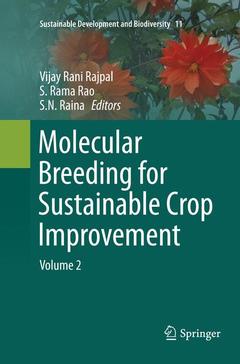Molecular Breeding for Sustainable Crop Improvement, 1st ed. 2016 Volume 2 Sustainable Development and Biodiversity Series, Vol. 11
Coordonnateurs : Rajpal Vijay Rani, Rao S. Rama, Raina S.N.

Preface.- 1. Use of alien genetic variation for wheat improvement; P.K. Gupta.- 2. Quantitative trait loci mapping in plants: concepts and approaches; D. Sehgal.- 3. Developing and deploying abiotic stress tolerant maize varieties in the tropics: challenges and opportunities; B.M. Prasanna.- 4. Harnessing apomixes for heterosis breeding in crop improvement; V. Bhat.- 5. Status and opportunities of molecular breeding approaches for genetic improvement of tea; R. Kumar Sharma.- 6. Molecular cytogenetic approaches in exploration of important chromosomal landmarks in plants; Y. Mukai.- 7. Technological advances in studying gene pool diversity and its exploitation; S. Goel.- 8. Introgression and exploitation of QTL for yield and yield components from related wild species into rice cultivars; K. Neelam.- 9. A molecular phylogenetic framework for Timothy (Phleum pratense L.) improvement; A. Stewart.- 10. Genetic improvement of basmati rice – The journey from conventional to molecular breeding; A.K.Singh.- 11. Genetic diversity and coffee (Coffea sps) improvement in India; R.K. Aggarwal.- 12. Introgression and exploitation of biotic stress tolerance from related wild species in wheat cultivars; P.Chhuneja.- 13. Genetic improvement of sugarcane through conventional and molecular approaches; S.Kumar.- 14. Germline transformation for crop improvement; R. Tandon.- 15. Advances in molecular breeding of pearl millet; D. Sehgal.- 16. Molecular marker-based selection tools in spring bread wheat improvement: CIMMYT experience and prospects; S. Dreisigacker.- Index.
Date de parution : 03-2018
Ouvrage de 478 p.
15.5x23.5 cm
Disponible chez l'éditeur (délai d'approvisionnement : 15 jours).
Prix indicatif 158,24 €
Ajouter au panierDate de parution : 02-2016
Ouvrage de 478 p.
15.5x23.5 cm



